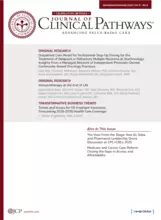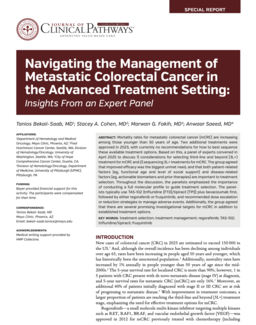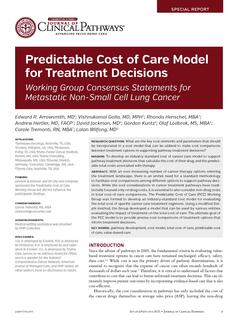A Roadmap to Meaningful Health System Reform
The US health care system is failing far too many patients with cancer. Despite unprecedented medical advancements, access to affordable, high-quality care is being systematically undermined by rising costs, hospital consolidation, insurer-driven barriers, and bureaucratic red tape. Patients and their families are ultimately bearing the brunt—forced to navigate a system that too often prioritizes profit over patient well-being.
But it doesn’t have to be this way. That’s why the Community Oncology Alliance (COA) developed the COA Prescription for Health Care Reform.1 This is a comprehensive, five-part plan outlining specific, achievable solutions that policymakers can implement today to fix what is broken and ensure every patient can access the care they deserve.
Reversing the Damage of Unchecked Hospital and Health System Consolidation
For more than two decades, unchecked system consolidation has eroded competition, driven up costs, and reduced patient access—especially in cancer care. Independent oncology practices, which historically provided affordable, high-quality cancer treatment in local communities, have been decimated by a system that favors hospital-owned providers. The result? Higher costs, fewer choices, and worse outcomes.
Hospitals have leveraged site-of-service payment disparities, 340B Drug Pricing Program loopholes, and aggressive market consolidation to force patients into higher-cost care settings. This is particularly devastating in rural and underserved areas, where independent clinics have been forced to close or sell out to hospitals, further limiting access and driving up costs.
Congress must enact the following meaningful reforms:
- Implement site-neutral payment policies to ensure fair reimbursement across care settings so hospitals are not paid significantly more for the same services provided in independent practices.
- Modify the 340B Drug Pricing Program to stop large, well-funded hospital systems from exploiting discounts without passing savings on to patients.
- Strengthen antitrust enforcement to curb anti-competitive mergers that eliminate independent providers and limit patient choice.
Without these changes, consolidation will continue unchecked, which will reduce competition, drive costs even higher, and ultimately leave patients with fewer and more expensive options for care.
Reining in Pharmacy Benefit Manager and Insurer Abuses that Harm Patients
Today, it is well known that insurers and pharmacy benefit managers (PBMs) have manipulated the health care system for financial gain, contributing to inflated drug prices and restricted prescription access, and forcing patients into costlier, insurer-owned pharmacy networks. These middlemen control 80% of the prescription drug market, often dictating which medications are covered based on profit-maximizing rebates rather than medical necessity. Cancer patients—who don’t have time for delays—are being forced through unnecessary prior authorization hoops and steered toward PBM-affiliated pharmacies rather than receiving medication from their providers.
To fix this, Congress must enact the following insurer and PBM reforms:
- Mandate transparency in pricing, rebates, and reimbursement practices.
- Eliminate anti-competitive PBM practices that force patients into affiliated mail-order pharmacies or deny coverage for medications based on financial incentives rather than clinical evidence.
- Prevent insurers and PBMs from using step therapy and prior authorization to delay or deny timely access to critical cancer treatments.
If policymakers fail to act, PBMs and insurers—not doctors—will continue dictating treatment decisions while patients suffer unnecessary delays, financial hardship, and worse outcomes.
Fixing Medicare Reimbursement to Save Independent Practices
The Medicare Physician Fee Schedule (PFS) has failed independent oncology practices by steadily cutting reimbursement while driving up practice costs. Medicare payments have not kept pace with inflation, making it harder for independent providers to sustain operations, recruit talent, and remain financially viable.
Meanwhile, hospitals receive higher reimbursement rates for the same services, fueling consolidation and driving up Medicare costs for both taxpayers and patients. If this misaligned reimbursement system continues, independent practices will continue disappearing and cancer patients will be left with fewer, more expensive care options.
Congress must take the following action to stabilize the Medicare system for independent practices:
- Reverse and prevent further cuts to Medicare PFS, ensuring independent oncology practices remain sustainable.
- Tie reimbursement rates to inflation so physician payments reflect real-world costs.
- Eliminate the Medicare sequester for independent practices to relieve financial strain.
Without urgent changes, independent providers will be forced out of the system, and patients will bear the consequences of reduced access and skyrocketing costs.
Fixing Drug Shortages and Ensuring Supply of Generic Sterile Injectable Drugs
The carboplatin and cisplatin shortages of 2023 were a wake-up call. Essential generic sterile injectable (GSI) drugs, which form the backbone of cancer treatment, have become alarmingly scarce due to fragile supply chains, unsustainable pricing models, and a lack of domestic manufacturing capacity.
To prevent future shortages and protect patient access, Congress must:
- Incentivize domestic production of GSIs through tax credits and market stability measures.
- Ensure reimbursement models encourage continued manufacturing of low-cost but essential cancer drugs.
Reforming Inflation Reduction Act Drug Pricing Policies to Ensure Practices Survive
The introduction of drug price negotiation and other reforms in the Inflation Reduction Act (IRA) offer major patient benefits but pose a ticking existential time bomb for independent oncology practices. By placing providers in the middle of negotiations with manufacturers, the government is threatening the financial viability of cancer treatment in independent settings.
The problem lies in how the IRA’s mandated lower drug prices will slash Medicare and commercial Part B drug reimbursement, leaving practices unable to cover the essential costs of drug procurement, storage, and administration. An Avalere analysis commissioned by COA found that these reimbursement cuts will reduce practice revenue by double-digit percentages—an unsustainable hit for independent providers.2 If not corrected before the law is fully implemented in 2028, the IRA will accelerate the closure or consolidation of independent practices, shifting more care into hospitals where treatment is more expensive for both patients and Medicare.
Reforming Medicare and Reducing Administrative Barriers
Medicare’s outdated payment structure and bureaucratic hurdles have fueled consolidation, reduced competition, and increased costs for both patients and providers. The Center for Medicare and Medicaid Innovation (CMMI) was supposed to foster value-based models, but instead its onerous requirements have made participation burdensome and financially risky—pushing independent oncology practices out of reform efforts entirely.
Additionally, Medicare’s failure to enforce Part D regulations has enabled PBMs to dictate drug pricing and reimbursement, hurting independent pharmacies and creating pharmacy deserts in rural areas. The US Centers of Medicare & Medicaid Services (CMS) must actively enforce fair reimbursement for independent pharmacies and prevent PBMs from using predatory pricing tactics that threaten access to essential medications. Without real oversight, PBMs will continue exploiting Medicare Part D to maximize profits at the expense of patient access.
To modernize Medicare and reduce administrative burdens, Congress must:
- Overhaul Center for Medicare and Medicaid Innovation (CMMI) models to make value-based care workable for independent practices.
- Fix Medicare Part D oversight to ensure fair PBM reimbursement and prevent independent pharmacy closures.
- Allow direct contracting with self-insured employers to support innovative care models.
Without these reforms, outdated Medicare policy will continue pushing independent providers out, leaving patients with fewer, costlier options for care.
A Call to Action for Policymakers and Advocates
The COA Prescription for Health Care Reform provides a clear, actionable framework to address the most pressing issues in cancer care. The problems—consolidation, insurer/PBM abuses, broken reimbursement models, drug shortages, and outdated Medicare policies—are all fixable with strong leadership and action from policymakers.
Congress must act now before more independent practices disappear, costs skyrocket, and patients lose access to life-saving care. The solutions COA has provided are clear, evidence-based, and ready to be implemented. This is not a partisan issue—it is a patient issue. The time for action is now.
Clinical Pathway Category: Business
Access to affordable, high-quality cancer care is being systematically undermined by rising costs, hospital consolidation, insurer-driven barriers, and bureaucratic red tape. Clinical pathways can offer ways to help providers navigate policy changes meant to address these issues and provide better clinical effectiveness.
References
1. Community Oncology Alliance. COA prescription for health care reform: a policy blueprint for congress. February 2025. Accessed March 20, 2025. https://mycoa.communityoncology.org/education-publications/report/coa-prescription
2. Sullivan M, Dilmanian M, Frazier L, Krupp G, Isaiah E. Commercial spillover impact of Part B negotiations on physicians. September 16, 2024. Accessed March 20, 2025. https://advisory.avalerehealth.com/insights/commercial-spillover-impact-of-part-b-negotiations-on-physicians













